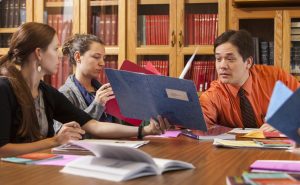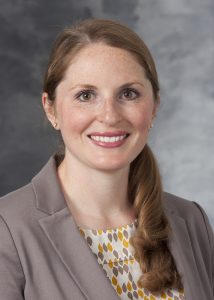A 15-year veteran of the University of Wisconsin Department of Ophthalmology and Visual Sciences will soon be stepping aside from his role as Director of Medical Student Education. But he’ll be handing the reigns to a familiar face – one who is uniquely suited to take on the position.
Over the next two-to-three years, Daniel Knoch, MD will be gradually handing off elements of medical student education to Jennifer Larson, MD, beginning with the oversight of the Phase 2 ophthalmology curriculum and culminating in the full transfer of duties and responsibilities.
“After many years of doing this, it’s time for someone else to have this opportunity,” Knoch said. “It’s a good time to step down and allow someone else the chance to grow.”
Knoch has served as Director of Medical Student Education since 2007. Since that time, he’s helped make impressive strides in the ophthalmology education offered to medical students through the UW School of Medicine and Public Health (SMPH).

“I wanted to make sure that ophthalmology had a home at SMPH and we now have that as part of Surgical and Procedural Care with a completely revamped and updated curriculum,” he said. “I also wanted to make sure that we had a national curriculum with a repository of accessible information, and we have that on the American Academy of Ophthalmology’s Medical Student Educators website. I also was hoping to have a test that is used at multiple institutions, and we have that as well.”
Knoch’s successor, Larson, has served as an assistant professor of ophthalmology with DOVS since 2018. Before joining the department’s faculty, she completed medical school, an internship and an ophthalmology residency all here at the University of Wisconsin. That experience of being both a learner and a teacher at UW made Larson the perfect candidate for the position, according to Knoch.
“She’s been through the entire process,” he said. “She understands receiving the message and now she’ll be giving the message. There are so many nuances in how you talk to students, how you get them to be their best, how you prepare them for a career while also giving them a high-quality educational experience. This is not a position you just jump into, but she’s ready for it.
As for Larson, she says she’s thrilled – and only a little intimidated – to be stepping into the role that Knoch filled for more than a decade.
“I’m just very honored to be able to follow in his footsteps,” she said. “I’ve seen the first-hand effect that excellent educators like him can have on budding doctors. And that’s part of the reason I went into academic medicine in the first place. I wanted the opportunity to educate the next generation of physicians.”

For Larson, the work starts this summer with Phase 2 education, which is part of the UW School of Medicine and Public Health’s ForWard Curriculum. Phase 2 entails an entire year of clinical rotations and hands-on coursework for second- and third-year medical students. During this Phase, medical students complete rotations in many specialties, including ophthalmology.
“It’s so crucial for physicians of all different specialties to know about the eye and the common pathologies that their patients may be affected with,” Larson said. “We need to teach them how to appropriately triage and treat these issues, and match patients with the appropriate resources.”
Knoch, who played a key role in developing the Phase 2 ophthalmology curriculum, echoes that sentiment and says that he’s had former students reach out to him years later with stories about how they caught things like strokes based on signs and symptoms they learned about during that ophthalmology curriculum.
Knoch also says Phase 2 is a key time to begin mentoring students who express interest in pursuing ophthalmology as a subspecialty: students just like Larson.
“Dr. Knoch has just been an incredible mentor and role model throughout my whole education,” she said. “I just really credit him with the trajectory of my career path and I’m just very honored to continue on this awesome path that he’s outlined for me.”
Throughout his tenure as Director of Medical Student Education, Knoch has accomplished much and received plenty of accolades. He has served on national committees, worked to standardize testing criteria for medical students, and through his outside activity, helped create an accessible, online curriculum that can be accessed by outside medical students who may not have ophthalmology rotations at their home institutions.
He also received the Medical Alumni Association’s Clinical Science Teaching Award in 2008, the UW SMPH Medical Student Outstanding Clinical Teacher Award in 2011, the Dean’s Teaching Award in 2013, the Award for Excellence in Medical Student Education from the AUPO in 2018, and the Secretariat Award from the AAO in 2019.
That’s on top of receiving a DOVS Ophthalmology Residents Teaching Award in 2009, 2012, 2017, and 2021.
While it may sound like a retirement, it’s anything but. Knoch will remain with DOVS in his role as Professor and Vice Chair of Education and Faculty Development, and will continue to see patients through UW Health’s Eye Clinics.
When asked about the best advice he could give to Larson to succeed in this role, Knoch offered guidance both practical and personal.
First, the practical: listen to your students.
“Really listen to them and pay attention to your evaluations,” he said. “You need to be reactive to what your students are telling you, and you also need to be nimble as times change.”
Then, the personal: enjoy the ride.
“When your students get out of medical school and start their careers, they often reach back out and thank you,” Knoch said. “That’s how you know you’ve really gotten through to the students. So even though the payoff sometimes only comes years down the road, it feels really good when it happens.”